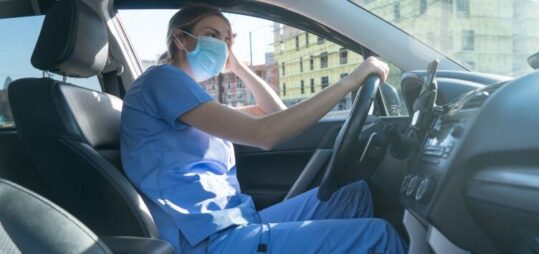Nurses skipping meals and struggling to afford transport to work, survey finds

Nurses are increasingly struggling to afford transport to work and, in some cases, even skipping meals to feed and clothe their children as the cost-of-living crisis deepens, NHS leaders have reported.
A survey of NHS trust leaders, conducted by NHS Providers between August and September 2022, has revealed that the cost-of-living crisis is having a ‘severe’ impact on healthcare staff’s mental and physical health, as well as the trust’s ability to provide care.
The survey also showed that 71% said that many staff were struggling to afford travel into work and that this was having a significant impact on their employing trust, while 44% said staff are opting out of the NHS pension plan as they can no longer afford the payments.
The mental health impacts of the rising cost of living was also a significant issue for many trusts and their staff, with 78% of trust leaders saying they are extremely concerned about the mental wellbeing of their staff.
Related Article: BREAKING: Nurses to staff neighbourhood health centres under 10-year plan
The majority of leaders now say that they have seen an increase in the number of mental health sick days being taken by staff.
Miriam Deakin, interim deputy chief executive and director of policy and strategy at NHS Providers, said: ‘Our survey reveals just what NHS staff are going through, on top of the psychological impact of the pandemic and high levels of work-related stress.
‘Trusts have called it a ‘tipping point’ for the workforce. All NHS staff have been given below-inflation pay awards this year by the Government, leaving them worse off in real terms.’
In the survey, three quarters of trusts said they are extremely concerned that the workforce shortages will be worsened by the below inflation pay offer made to nurses earlier this year.
Additionally, two-thirds of leaders reported experiencing severe disruption as staff leave for better pay in pubs, shops, and supermarkets.
Related Article: NHS Unite members in Wales reject pay award and signal appetite for strikes
The report also highlighted concerns that the cost-of-living crisis is increasing the workload placed on the NHS as stress and fuel poverty erode public health.
In addition, 95% of trust leaders said the rising cost of living has either significantly or severely worsened health inequalities in their local area. and the vast majority say that they have seen an increase in mental health presentations.
RCN general secretary and chief executive, Pat Cullen, said: ‘When half of the NHS needs to open food banks for its own staff, ministers’ heads should be hanging in shame.
‘This long list from the heart of the NHS shows what’s really happening to our nation’s greatest asset and the hard working staff inside it. Tens of thousands of nurses are driven out by this treatment and patients pay the price. In less than a week, our members will begin voting for strike action and saying to government that enough really is enough.’
Related Article: New ‘first-of-its-kind’ adult social care nursing faculty

See how our symptom tool can help you make better sense of patient presentations
Click here to search a symptom




